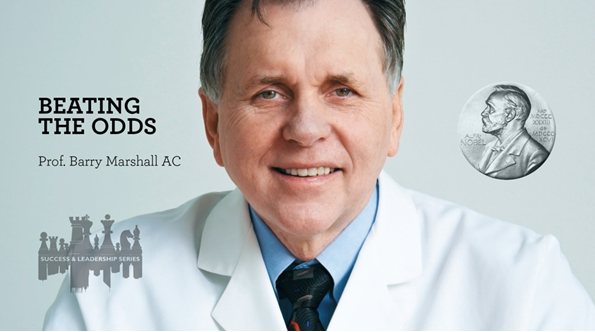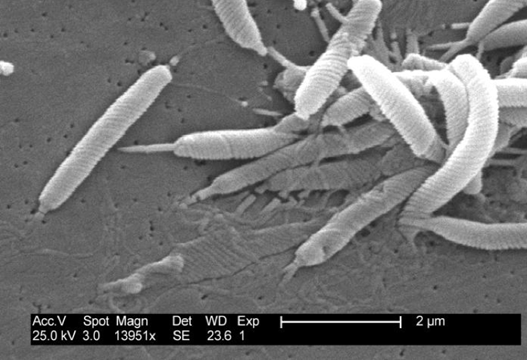For the 177th edition of the Luojia lecture series, Nobelist Dr. Barry J. Marshall was invited to deliver a speech on his monumental discovery of the bacterium Helicobacter Pylori. Dr. Marshall is currently serving as a Professor of Clinical Microbiology at the University of Western Australia. Dr. Marshall and Robin Warren were awarded the Nobel Prize in Physiology or Medicine for their discovery of H. pylori and its role in gastritis and peptic ulcer disease. In 1981, Marshall began working with Robin Warren, the Royal Perth Hospital pathologist, who had discovered colonies of bacteria at gastric ulcer sites. In 1982, they discovered that H. pylori can be eliminated by administering antibiotics to ulcer patients, hence curing them of gastric ulcers.

Prof. Barry J. Marshal
He started off his speech in Chinese, drawing thunderous applause, and then switched back to English. He talked about the many similarities between China and Australia owing to the same time zone. He shared the several stages of his life, his struggles with the research, his out of the box ideas and ultimately the unprecedented discovery.
The scientific community had long believed that ulcers resulted from stress, completely ignoring the existence of H. pylori. Therefore, he decided to prove his postulates by using himself as a human subject. Now H. pylori has been acknowledged as the causative agent of peptic ulcers and gastritis, not just as a mere pathogen. It is a breakthrough in understanding the link between H. pylori infection and stomach cancer, of which gastritis is an established precursor. Their seminal work in understanding H. pylori has almost eradicated stomach ulcers in most countries through revolutionary treatment with antibiotics.

Helicobacter Pylori under electron microscope
He shed some light into a long-forgotten connection, “there is a very interesting connection with the Nobel Prize. Alfred Nobel probably also had H. pylori. Hundred years ago, in the 19th century, almost every human had some problems, one himself was Nobel.”
He shared the reason behind his scientific journey, “We didn’t know the underlying cause of ulcer. Everybody said it was stress and hereditary factors. Dr. Warren and I, we were trying to change the dogma. Doctors are very conservative. They don’t want to change their opinion on stuff. That’s what started us on our research.”
According to him, his economic condition at that time was not good, “In those days, I was poor. I had too many children and not much money. I used to get my trousers from Panmart, someplace like Walmart. So they didn’t fit me well.”
About the pharmaceutical companies’ reluctance towards finding a cure, he said, “The thing you should remember about medical research, pharmaceutical companies depend on treatment. You keep buying it every week, every month and maybe for the rest of your life. Their share price is going up. Everybody is investing in them. They didn’t want the opinion of others about the cure of ulcer because treatment support these companies”. Even though, he couldn’t get his message through, he was optimistic, “If you had the most cost effective treatment where you understand the pharmacological principles, then you can produce treatment. You can develop a cure and that will be much less expensive.”
He even mentioned the work done by Chinese scientists in this domain, “In China, they didn’t believe it was stress. They thought it was some kind of bacterial problem in the stomach. They did find some patients got better when they gave antibiotics. So they could have cured H. pylori. However, when they gave it to patients with ulcers, the problem would come back in a few months.”
A scientist’s academic publications reflect their interest in cutting-edge research. He added, “It’s the first publication, that’s where you start. Many people who have won the Nobel Prizes, their first paper is extremely hard to find”. He was also very sincere about his earliest failures in publishing, “Sadly it was very difficult because it was a new level. Our research paper was not accepted for presentation. Out of 67 abstracts submitted they could only accept 56. Our paper, in the bottom 20%, was one of the worse ones. I didn’t go to the conference but I always kept the rejection letter.”
He then shifted his focus to how physicians have been confused with multiple false causes, “In history, there were many causes of ulcer which were false. That’s the illusion of knowledge. Stress, diet, alcohol and genetic causes, all those things, were a very small percentage. In my opinion, we can never get rid of the illusion of knowledge.”
They started trying many different ways to culture bacteria in the stomach and they desperately needed to see if the bacteria could infect a healthy person. They didn’t have any volunteers to take part in the human trials. So, Dr. Marshall, a medical heretic, prepared himself for self-experimentation, drinking the concoction of cultured bacteria, “I didn’t know what was going to happen. So I drank H. pylori, fingers crossed, to see what happens, and for three or four days, I didn’t feel too bad. Then on the fifth day, I started throwing up. I was feeling some discomfort in the stomach.”
He demonstrated symptoms of acutegastritis. Stomach biopsies confirmed that the affected areas of his stomach were infected with H. pylori. Marshall subsequently cured himself with antibiotics.
They became the first to confirm H. pylori as the cause of gastritis and peptic ulcer. Stomach ulcer, a disease that had plagued mankind for centuries, could now be treated with two weeks of antibiotic treatment. He continued, “Gastritis affect more than half of the whole human race. So it started as Dr. Warren and I doing this research on bacteria and next thing you know we had discovered some new disease nobody has ever heard of. “After his work at Fremantle Hospital, Marshall joined the University of Virginia in the United States for further research.
At the end of his speech, he revealed how H. pylori is transmitted, “You catch it from your mother, who was probably kissing you when you were a baby, or feeding you. You catch it from the saliva. Everybody probably catch it as small children but many years later, they might get an ulcer. But it persists probably because it produces toxins”. The floor was then opened for questions and the students and science enthusiasts peppered him with questions. He humbly cleared their doubts and unequivocally sparked an interest in them to conduct far-reaching medical researches.
Apart from Nobel Prize, Dr. Marshall has won many other accolades for his work, including Warren Alpert Prize ( 1994), Albert Lasker Award for Clinical Medical Research (1995), Paul Ehrlich and Ludwig Darmstaedter Prize (1997) and Buchanan Medal of the Royal Society (1998), Benjamin Franklin Medal for Life Sciences (1999) and Keio Medical Science Prize (2002).In 2007, he was also appointed a Companion of the Order of Australia, the highest civic honor in the country. He founded a biotechnology company, Ondek which uses immune regulatory properties of H. pylori in allergy-prevention products for young children.
Photo by: YouTube and Wikipedia
Edited by: Li Yunzhen, Sunjingyi, Edmund Wai Man Lai & Hu Sijia